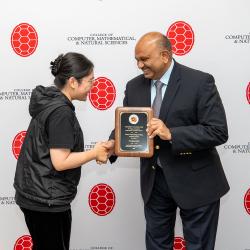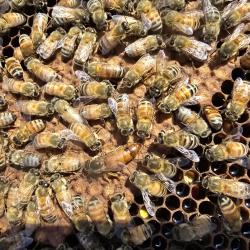Parsing Big Data to Identify Hidden Threats
UMD students make a difference at Capital One during Break Through Tech’s micro-internship program.

Imagine being sick, taking an expired medication and contracting a more serious illness. You tried to improve your situation but ended up making it worse. That’s exactly what can happen when banking customers accidentally use expired data certificates—they leave themselves more vulnerable to threats.
Five University of Maryland students partnered with Capital One over winter break to learn innovative tech and complete work that made a positive difference for customers.
The partnership was part of Break Through Tech’s Sprinternship program, which launched in 2022 at UMD to propel more women and nonbinary students into tech careers. First- and second-year computing students are matched with host organizations in the D.C. area to spend three weeks immersed in their workplace cultures while tackling assigned business challenges.

Learning innovative tech
At Capital One, the five students took eight courses in Tech College—a learning platform created by Capital One with thousands of free classes for associates to learn more about the latest technology. The Sprinterns also paired off with different associates to complete a series of assigned tasks. This rotation gave each student a chance to form relationships, learn from one another and gain experience building different parts of a larger project.
“It was refreshing to be able to work together as a team,” said first-year computer science major Isatou Jawara. “I’m a freshman and haven’t had a chance to do a group project yet, so I learned a lot from this experience.”
The students used 10 technologies Capital One technologists currently use on their project—including Hawkeye, Python and Snowflake—and learned a host of new professional skills along the way.
“I remember the first week, one of you looked at me and said, ‘I don’t know what a cert is.’ And I said, ‘Well, we’ve gotta change that,’” the team’s supervisor Maddy Pet said to them after their final project presentation. “I am so proud of you all—you went above and beyond, you delivered, and it was fantastic. You were so hungry for knowledge, and you just devoured every lesson that we threw at you.

Completing work that matters
As much time and support the students had to learn, they also made a lasting impact at Capital One.
The students worked with the Crypto Services Certificate Authority team to identify expired data certificates, which ensure data is transmitted privately and safely. Once compromised, the certificates can leave users open to cyber attacks.
“The students delivered the project in a way that we can continue to use it once the students leave and then build on top of what they’ve done,” said Kevin Behrooz, Capital One’s director of cyber data protection. “This was a great success.”
The Sprinterns' contribution is saving the Capital One team hours of future software engineering work by automating processes to reduce the number of certifications they would need to manually investigate. The engineering team anticipates that this project will continue to benefit Capital One and the students.
“Getting hands-on experience, applying the knowledge we learn in class and knowing that the work we’ve done has value and makes a difference here at Capital One meant so much to me,” said sophomore computer science major Sathvika Sangoju. “It’s something I’ll take with me as my career in the tech field continues to grow.







